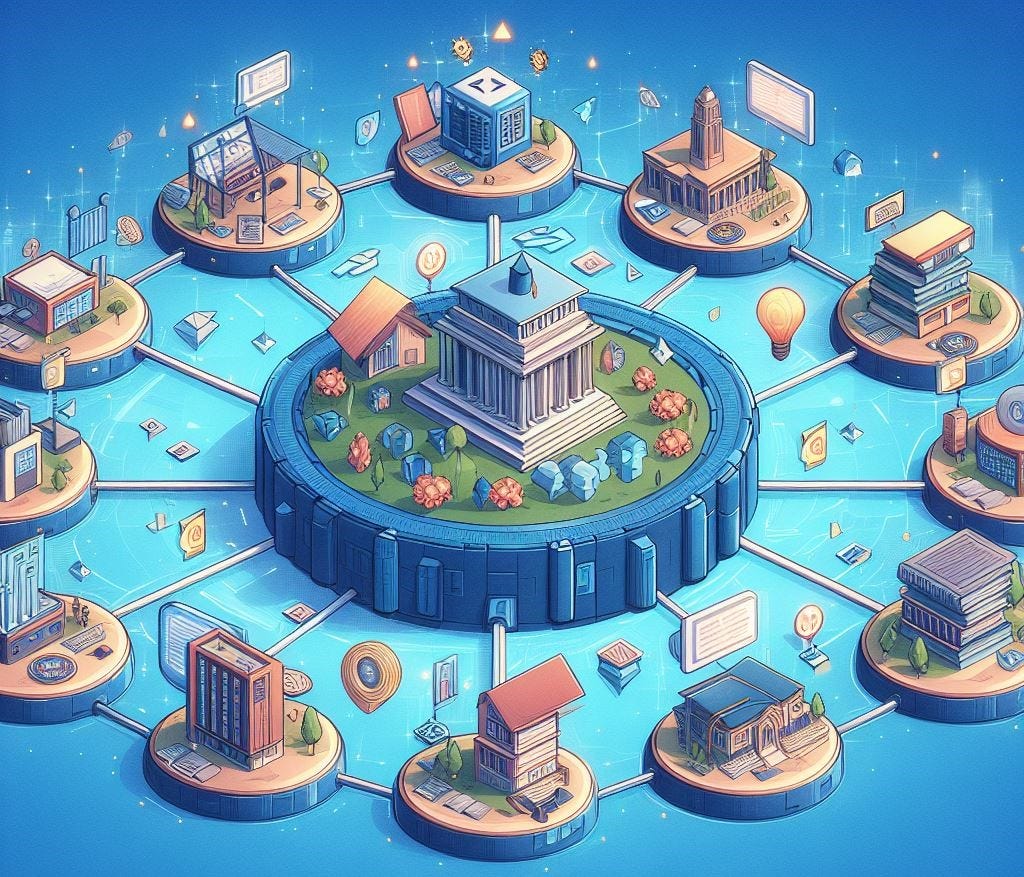Our conventional educational system has for quite some time been described by incorporating record-keeping, regulatory cycles, and an absence of straightforwardness. From overseeing scholarly qualifications to dealing with regulatory undertakings, there is a developing requirement for creative arrangements that can address the weaknesses of the ongoing framework.
At its center, blockchain is a dispersed and permanent computerized record that records exchanges across an organization of PCs. It works on a decentralized agreement instrument, guaranteeing that data is secure, straightforward, and impervious to altering. Understanding the essentials of blockchain is significant to getting a handle on its expected applications in the training area.
Blockchain works through a chain of blocks, each containing a rundown of exchanges. These blocks are connected and gotten utilizing cryptographic hashes, making a chain that is impervious to modification. Key highlights like decentralization, straightforwardness, and cryptographic security make blockchain an incredible asset for changing different parts of the schooling system.
Academic records are the foundation of educational establishments and serve as evidence of students’ accomplishments and qualifications. Nonetheless, the conventional techniques for overseeing and checking these records frequently miss the mark, bringing about difficulties that impede productivity and straightforwardness. In this part, we dig into the ongoing difficulties, investigate the groundbreaking job of blockchain, and look at genuine instances of fruitful executions.
Blockchain innovation arises as a promising answer for the weaknesses of conventional scholarly records of the executives, offering a change in perspective in how certifications are obtained and checked.
- Immutable Record Keeping: The decentralized and alter safe nature of blockchain guarantees that once scholastic information is recorded, it turns into an extremely durable, unalterable installation. Academic records’ security and integrity are enhanced by this immutability.
- Decentralized Verification: Blockchain empowers immediate and decentralized confirmation of scholarly accreditations. Rather than depending on a focal power, partners, for example, businesses or other instructive establishments can freely approve capabilities through the blockchain, decreasing bottlenecks.
In the quickly developing scene of schooling, the conventional brought together learning stages that have been the foundation of scholastic conveyance face a heap of difficulties. These difficulties, going from restricted availability to issues of control and straightforwardness, have prodded the investigation of elective models. One such model that holds incredible commitment is the idea of decentralized learning, upheld by the groundbreaking capacities of blockchain innovation.
Decentralized learning addresses a change in perspective, imagining a learning climate that is conveyed, comprehensive, and strong. At its center, decentralized learning is established on rules that counter the limits of unified frameworks. Key benefits include:
- Accessibility and Inclusivity: By removing geographical barriers and providing opportunities for students who were previously underserved, decentralized learning platforms can make education accessible to individuals all over the world.
- Enhanced Privacy and Security: By utilizing blockchain’s cryptographic standards, decentralized learning stages offer elevated security and protection. Clients hold command over their information, and exchanges are kept in an alter safe way, decreasing the gamble of information breaks.
- Flexibility and Adaptability: Decentralized frameworks empower more adaptable administration structures, encouraging versatility to changing instructive ideal models. This flexibility takes into consideration the reconciliation of arising advances and creative instructing strategies.
In the mind boggling school activities, the treatment of monetary exchanges presents significant difficulties, affecting both the foundations and the understudies they serve. There have been a lot of problems with the old ways colleges manage their financial interactions that make it hard to be productive, accountable, and accessible. This part dives into the ongoing obstacles in monetary exchanges, investigates how blockchain innovation can carry straightforwardness to these cycles, and blueprints the possible advantages of executing blockchain in overseeing understudy installments.
Blockchain innovation presents a change in outlook in how monetary exchanges are overseen inside schools, offering answers for the common difficulties:
- Decentralization and Transparency: By utilizing a decentralized record, blockchain takes out the requirement for a focal expert in monetary exchanges. This cultivates straightforwardness, as all significant gatherings have continuous admittance to a safe and unalterable record of exchanges. Each exchange is kept in an alternate safe way, giving an auditable path.
- Smart Contracts for Automation: Smart contracts, self-executing contracts with the details of the arrangement straightforwardly composed into code, can computerize different monetary cycles inside universities. This incorporates the programmed dispensing of grants, convenient installment of expenses, and effective taking care of discounts. Mechanization lessens the possibilities of human blunder and smoothes out monetary tasks.
Carrying out blockchain in overseeing understudy installments holds the commitment of a few benefits that can emphatically influence both instructive establishments and understudies:
- Faster and Efficient Transactions: Due to its near-instantaneous nature, blockchain transactions speed up the processing of payments, refunds, and aid disbursements. This speed upgrades the general proficiency of monetary tasks inside schools.
- Reduced Costs: The computerization and straightforwardness presented by blockchain can prompt expense investment funds for schools. By limiting manual endeavors and smoothing out processes, foundations can assign assets all the more successfully, possibly diminishing the monetary weight on understudies.
- Enhanced Security: The cryptographic principles that underpin the blockchain guarantee a high level of security for financial transactions. The decentralized idea of the innovation makes it impervious to hacking and unapproved access, giving a powerful protection against potential security dangers.
- Improved Accountability:The straightforward and alter safe nature of blockchain guarantees that each monetary exchange is recorded precisely. All stakeholders, including students, colleges, and financial institutions, are held accountable as a result.
In conclusion, the excursion towards broad blockchain mix in training isn’t simply a mechanical development; it is a change in outlook. As blockchain turns out to be more imbued in the instructive biological system, we can expect a future where the limits of learning are extended, and the groundbreaking capability of blockchain is completely understood, introducing another time for school life.
This news is republished from another source. You can check the original article here







